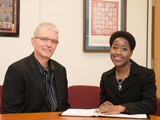Community and Extended Connection
Advancing excellence: our strategic planning strategy groups
This is the last in a series of articles on the four focus areas that are part of UMBC’s strategic planning process.
Steve Bradley, associate professor and graduate program director, visual arts, and Mavis Sanders, professor, education, bring their passions for community partnerships and collaboration across disciplines to their work as co-chairs of the Community and Extended Connection strategy group.
Bradley, who joined the UMBC faculty in 1995, says he was attracted to the campus by its focus on collaboration within and across disciplines, and the very first course he taught at UMBC was community-based. He has continued to work on collaborative projects throughout his tenure, most recently an interdisciplinary digital mapping project in Baltimore City with Nicole King, assistant professor, American studies. He also is part of UMBC’s BreakingGround initiative, looking at civic agency from a broad perspective. “These types of collaborations are what keeps me here and it’s only getting better,” says Bradley.
Sanders came to UMBC just three years ago, but for over 20 years has conducted research on family, school and community partnerships. For the last decade, she has also focused on collaborative leadership. She recently began working with the Shriver Center to find ways to coordinate outreach to pre-K-12 institutions.
The Community and Extended Connection strategy group’s primary goals are to build, nurture and extend relationships among diverse internal and external communities and partners to enrich campus life, local neighborhoods, the State and the surrounding region, and to foster innovative problem-solving and responsible entrepreneurship through strategic partnerships with alumni, government agencies, businesses and community-based organizations to create a sustainable and prosperous future for all.
Bradley is leading the strategy group in developing a conceptual map that will help provide an illustrated inventory of the range of UMBC’s partnerships both on and off campus, uncovering what’s going on now that may be under the radar. Both Bradley and Sanders hope their strategy group can create a roadmap that will build, sustain and strengthen the university’s diverse connections, on and off campus, expanding the impact of the work happening now and in the future. They will research ways to build upon successful partnerships and to strengthen any weaknesses within those initiatives, as well as look at ways to create new ones.
In addition, the Community and Extended Connection strategy group is charged with finding ways to support and reward members of the UMBC community for their initiatives, search for ways UMBC can be a more effective partner with underserved communities; investigate how to effectively communicate contributions; establish best practices for partnerships on and off campus; and decide what personnel, technology and other resources are needed to create a campus-wide system to record, track and evaluate partnerships and engagement with the community.
Sanders says, “UMBC’s strategic planning process is a timely opportunity because there are many different conversations going on about how we ensure the work we all are doing is coordinated in such a way that we know the breadth of what’s happening. People don’t always know how engaged the campus is, but it’s pretty expansive. The university is stronger because of the wide range of community, business and agency partnerships, and the opportunities they give our students to realize a vision of civic engagement and to gain professional experiences.”
“Our research will allow us to present that work in a systematic way, and show we care enough about these relationships to evaluate them,” adds Sanders. “It’s about creating a model of continuous improvement that is supportive and healthy for everyone involved.”
Bradley agrees. “As Provost Rous has said, we don’t want this research to just sit on a shelf somewhere. We’re charged with implementing this in a way that will strengthen our alliances and guide us in the future.”
The Community and Extended Connection strategy group will reach out to the campus via focus groups and larger meetings to get input on ideas. Bradley and Sanders also welcome questions and comments at sbradley@umbc.edu and msanders@umbc.edu.
Posted: May 21, 2014, 3:36 PM
